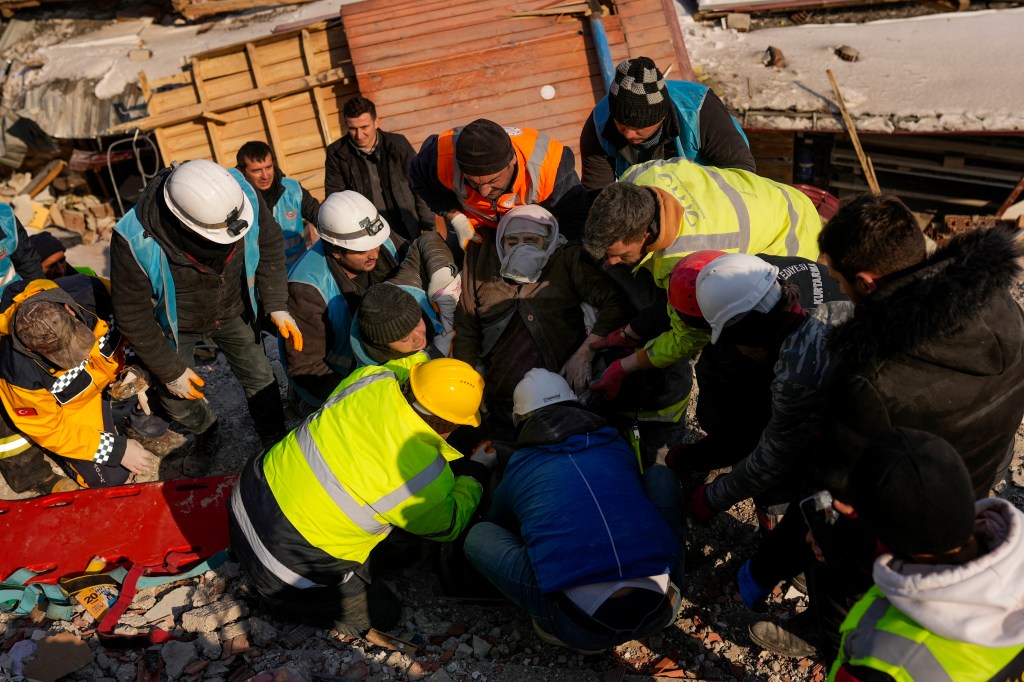Key developments in the aftermath of the Turkey, Syria quake
Published 12:44 pm Monday, February 20, 2023

- FILE — Turkish woman Hatice Korkut, center, 82, is rescued alive by rescue team members from a destroyed building in Elbistan, southeastern Turkey, Thursday, Feb. 9, 2023.
ANKARA, Turkey (AP) — There are reports of more collapsed buildings Turkey in Syria after another 6.4 magnitude earthquake struck Turkey’s Hatay province which was devastated by a massive tremor two week ago. Syria’s state news agency, SANA, is reporting six people have been injured in Aleppo from falling debris, while the mayor of Hatay says a number of buildings have collapsed, trapping people inside. Turkey’s disaster management agency, AFAD, said the new quake was centered around the town of Defne, in Hatay province. It was followed by a second, magnitude 5.8 tremor. NTV television said the quake caused some damaged buildings to collapse, but there were no immediate reports of any casualties. The quake was felt in Syria, Jordan, Israel and Egypt. The magnitude 7.8 earthquake which struck Feb. 6 has killed nearly 45,000 people in Turkey and Syria. Turkish authorities have recorded more than 6,000 aftershocks since.
Here’s a look at the key developments Monday in the quake’s aftermath:
More injuries, collapsed buildings
Syria’s state news agency, SANA, has reported that six people were injured and taken to hospital in the northern city of Aleppo as a result from falling debris shaken loose from buildings by the new tremor.
The Syrian opposition’s Syrian Civil Defense also known as White Helmets are reporting that several people have been injured in Syria’s rebel-held northwest after they jumped from buildings or when they wee struck by falling debris in the town of Jinderis, one of the most affected town by the Feb. 6 earthquake.
The White Helmets added that several damaged and abandoned buildings collapsed in Syria’s northwest without injuring anyone.
A spokesperson for the Syrian American Medical Society says that hospitals which the Society operates in northwest Syria have started to receive injured patients.
Turks urged to stay away from damaged buildings:
Turkish Vice President Fuat Oktay says inspections for damage were underway in Hatay and is urging citizens to stay away from damaged buildings and to carefully follow rescue teams’ directions.
The disaster management agency, AFAD, meanwhile urged citizens to stay away from the coastline as a precaution against “the risk of the sea level rising up to 50 centimeters high.”
People flee homes in Syria
Some media outlets in Syria’s Idlib and Aleppo regions that were badly affected by the new, 6.4 magnitude earthquake are reporting that some buildings have collapsed and that electricity and internet services have been interrupted in parts of the region.
The media outlets said many people fled their homes and are gathering in open areas.
Meanwhile, the White Helmets issued an alert urging residents in the country’s rebel-held northwest to follow guidelines released earlier regarding earthquakes and how to evacuate buildings.
DEATH TOLL APPROACHES 45,000
The Turkish disaster management agency, AFAD, has raised the number of confirmed fatalities from the earthquake in Turkey to 41,156. That increases the overall death toll in both Turkey and Syria to 44,844.
Search and rescue operations for survivors have been called off in most of the quake zone, but AFAD chief Yunus Sezer told reporters that search teams were pressing ahead with their efforts in more than a dozen collapsed buildings — most of them in the hardest-hit province of Hatay.
There were no signs of anyone being alive under the rubble since three members of one family — a mother, father and 12-year-old boy — were extracted from a collapsed building in Hatay on Saturday. The boy later died.
EU SEES RISK OF DISEASE OUTBREAK
The European Union’s health agency has warned of the risk of disease outbreaks in the coming weeks.
The Centre for Disease Prevention and Controls said that “food and water-borne diseases, respiratory infections and vaccine-preventable infections are a risk in the upcoming period, with the potential to cause outbreaks, particularly as survivors are moving to temporary shelters.”
“A surge of cholera cases in the affected areas is a significant possibility in the coming weeks,” it said, noting that authorities in northwestern Syria have reported thousands of cases of the disease since last September and a planned vaccination campaign was delayed due to the quake.
The ECDC also warned of viral infections such as hepatitis A, parasites and bacterial infections that can all be spread by difficult hygiene conditions in emergency shelters and camps.
SYRIA CALLS FOR TEMPORARY HOUSING UNITS
Syria’s minister of public works and housing, Suhail Abdul Latif, says the Syrian government will secure 350 housing units for people displaced by the earthquake and made a call for “friendly countries” to send more.
“We will secure the affected people within our capabilities, but after a while, it is not possible to continue placing families in shelters in order to preserve their health,” he said.
Housing has been a pressing need in all the earthquake-hit areas, with many families sleeping in makeshift tents or cramming into crowded schools and sports stadiums.
ERDOGAN SAYS RECONSTRUCTION TO START IN MARCH
Turkish President Recep Tayyip Erdogan, who faces elections in May or June, says his country will start building tens of thousands of new homes as early as next month.
Erdogan said the new buildings will be no taller than three or four stories, built on firmer ground and to higher standards and in consultation with “geophysics, geotechnical, geology and seismology professors” and other experts.
“We want to avoid disasters … by shifting our settlements away from the lowlands to the (more solid) mountains as much as possible,” Erdogan said in a televized address during a visit to hard-hit Hatay province.
The Turkish leader said destroyed cultural monuments would be rebuilt in accordance with their to “historic and cultural texture.”
Erdogan said around 1.6 million people are currently being housed in temporary shelters.
BLINKEN PRAISES AMERICANS’ RESPONSE
U.S. Secretary of State Antony Blinken has praised the support provided by Americans following the earthquake.
Blinken said in Ankara that the U.S. government had responded “within hours” to the disaster and had so far sent hundreds of personnel and relief supplies. But he said that ordinary Americans had also responded to “heartbreaking” images from the quake zone.
“We have nearly $80 million in donations from the private sector in the United States, (from) individuals. When I visited the Turkish Embassy in Washington, I almost couldn’t get in the front door because boxes were piled high throughout the driveway to the embassy,” Blinken said.
NATO SENDS CONTAINER HOMES
NATO says a ship carrying 600 temporary container homes has left Italy and is expected to arrive in Turkey next week.
The military alliance has pledged to send more than 1,000 containers that will serve as temporary shelters for at least 4,000 people left homeless by the earthquake.
NATO chief Jens Stoltenberg, who visited the quake-devastated region last week, called it the worst disaster in the alliance’s history.
Authorities say more than 110,000 buildings across 11 quake-hit Turkish provinces were either destroyed or so severely damaged that they need to be torn down.





